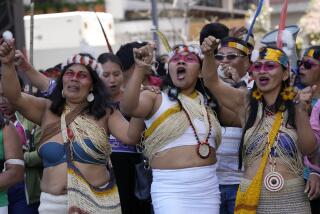Ecuador official denounces illegal mining after deadly conflict
- Share via
QUITO, Ecuador — The vice president of Ecuador on Friday denounced illegal mining as growing scourge a day after a violent confrontation between soldiers and miners in an Amazonian region left one civilian dead and nine soldiers wounded.
The violence occurred after soldiers attempted to confiscate river dredges and dislodge mostly indigenous miners in the province of Morona Santiago, about 200 miles southeast of Quito, the capital. Foreign mining concerns and small-scale miners, often without permits, have ramped up gold-mining projects in the region in recent years.
“These are armed and dangerous delinquents in organized mafias who are ready to kill to continue their illegal activities,” Vice President Jorge Glas told the state-owned Internet news website Ecuadorinmediato after visiting the wounded soldiers at a Quito military hospital. “But we aren’t going to let them.”
But an organization of Amazonian indigenous communities known as GONOAE in a statement Friday defended its right to mine as a matter of sovereignty and called the government’s action “dehumanizing.” The soldiers’ move against miners represented a government assault on its people, the group said.
“We aren’t defending illegality,” the group said. “We have reiterated on numerous occasions the need to legalize small-scale mining and that any government intervention on indigenous territory should be coordinated … to look for solutions and avoid the spilling of blood.”
As the prices of gold, silver and other precious metals have skyrocketed in recent years, illegal mining has become an increasing environmental, health and organized-crime problem for Ecuador and other countries, including Colombia and Venezuela.
Vast jungle and marsh areas across South America have been obliterated by hydraulic mining techniques used in legal and illegal operations. Rivers have been polluted with mercury and other chemicals used to separate gold from ore. In Colombia, suspected leftist rebels and criminal bands have taken over mining sites to extort money from those prospecting for gold.
Informal prospecting is also often accompanied by social problems, with miners and their families at times going without healthcare, social security or access to education.
Special correspondents Viteri and Kraul reported from Quito and Bogota respectively.
More to Read
Sign up for Essential California
The most important California stories and recommendations in your inbox every morning.
You may occasionally receive promotional content from the Los Angeles Times.













